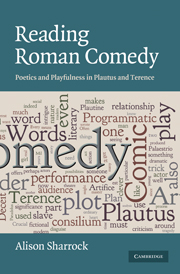1 - Art and artifice
Published online by Cambridge University Press: 18 December 2009
Summary
Below art, we find artifice, and it is this zone of artifice, midway between nature and art, that we are now about to enter.
(Bergson 1913: 66)Bergson's tempting twilight zone where artifice rules is the domain of comedy.
Comedy is an art form which delights in its artificiality, glories in its artifice, and actualises its art – all with apparently effortless ease and studied avoidance of obvious studiousness. This study concerns the particular form of comedy which flourished as a performance genre in the late third and early–mid second centuries bc, the plays being first produced as part of festivals celebrating one of the gods, or on other religious, social, and political occasions, such as the dedication of a temple or funeral games for a great man like Lucius Aemilius Paullus. The audience was on holiday and expecting a play to match, but it was also, at least in part, a sophisticated theatre-going crowd with experience of different types of dramatic performance and of other forms of art. The plays of Plautus and Terence flourished also as a textual genre which manifested itself in a much wider range of reading practices, including the scholarship of Varro, the rhetoric of Cicero, the epitomisation of the grammarians and moralisers, the exemplification of the schoolroom, and the imitation of the Western comic tradition.
- Type
- Chapter
- Information
- Reading Roman ComedyPoetics and Playfulness in Plautus and Terence, pp. 1 - 21Publisher: Cambridge University PressPrint publication year: 2009

